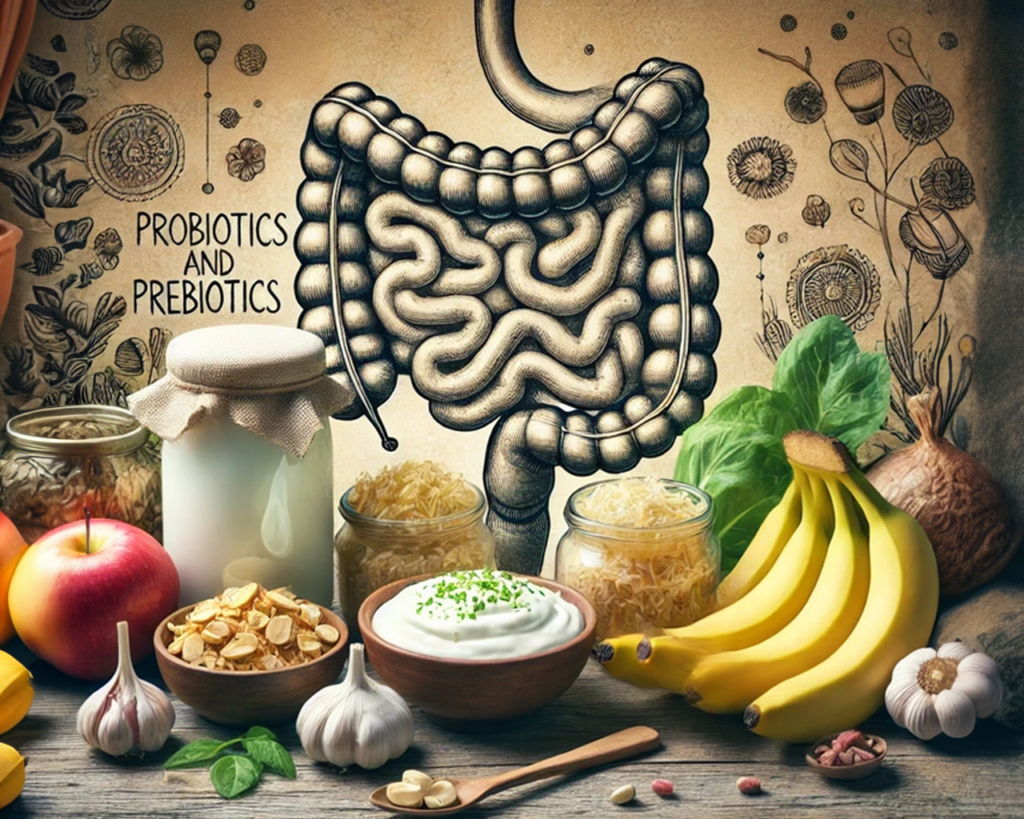🦠 What Is The Gut Microbiome:
Turns out we are completely colonized by both good and bad microorganisms (bacteria, fungi, and viruses). Good microorganisms typically keep bad microorganism populations in check by competing for the same resources.
The gut microbiome refers to the collection of trillions of microorganisms that live in the gut, where they play essential roles in digestion, immune function, and overall health. The gut microbiome helps break down complex carbohydrates, synthesizes vitamins, and protects against harmful pathogens.
Tasks that beneficial bacteria perform
- Aid Digestion: Help break down food in the digestive tract, making nutrients more accessible and easier to absorb.
- Produce Vitamins: Synthesize essential vitamins such as vitamin K and some B vitamins (e.g., B12, biotin).
- Protect Against Pathogens: Compete with harmful bacteria for resources and space, preventing infections.
- Boost Immune System: Stimulate the immune system, enhancing its ability to detect and respond to pathogens.
- Regulate Gut Health: Maintain the integrity of the gut lining and support the production of mucus, which protects the gut lining.
- Ferment Fiber: Convert dietary fiber into short-chain fatty acids (SCFAs) like butyrate, which have anti-inflammatory properties and provide energy for gut cells.
- Detoxify Harmful Compounds: Break down and neutralize toxins and carcinogens in the gut.
- Support Mental Health: Influence the gut-brain axis, potentially impacting mood, stress levels, and overall mental health.
- Enhance Metabolism: Help regulate metabolism and energy balance, potentially aiding in weight management.
- Modulate Inflammation: Produce anti-inflammatory compounds that can reduce systemic inflammation.
Here is what some of the good fungi do
- Balancing Microbiota: Good fungi can help maintain a healthy balance of the microbiota, preventing overgrowth of harmful microorganisms.
- Immune System Modulation: Some fungi can interact with the immune system in ways that enhance its function and help in maintaining health.
- Nutrient Absorption: Certain fungi may aid in the digestion and absorption of nutrients, similar to how some bacteria do.
Good viruses are wild
- Bacteriophages: These viruses infect and kill bacteria, which can help control harmful bacterial populations and maintain the balance of the microbiome. They are being explored as potential treatments for bacterial infections, especially antibiotic-resistant ones. We have actually used these in the hospital to treat patients that are colonized by super bacteria that are resistant to all antibiotics.
- Endogenous Retroviruses: These are viral sequences integrated into our genome over evolutionary time. Some of these sequences play crucial roles in processes like placental development and the regulation of gene expression.
🤔 Why You Need To know About The Gut Microbiome:
A balanced microbiome is crucial for maintaining homeostasis, while an imbalance (dysbiosis) can lead to various health issues. In fact, a healthy microbiome can can even influence mood and mental health. Dysbiosis has been linked to conditions like irritable bowel syndrome (IBS), obesity, type 2 diabetes, and even mental health disorders. By nurturing a diverse and balanced microbiome through diet, probiotics, prebiotics, and lifestyle choices, you can support your overall health and well-being.
Main Causes of Dysbiosis
- Antibiotic Use: Broad-spectrum antibiotics can kill beneficial bacteria, disrupting the balance.
- Poor Diet: Diets high in processed foods, sugar, and low in fiber can negatively affect gut health.
- Stress: Chronic stress can alter gut microbiota and compromise the gut barrier.
- Infections: Gastrointestinal infections can disturb the microbial balance.
- Environmental Factors: Exposure to pollutants and toxins can impact gut health.
- Medications: Aside from antibiotics, other medications like NSAIDs and proton pump inhibitors can affect the gut microbiota.
- Lifestyle Factors: Lack of sleep, excessive alcohol consumption, and sedentary lifestyle can contribute to dysbiosis.
🧠 Trivia:
The human gut contains approximately 100 trillion microorganisms – which is about 10 times the number of human cells in the body.



